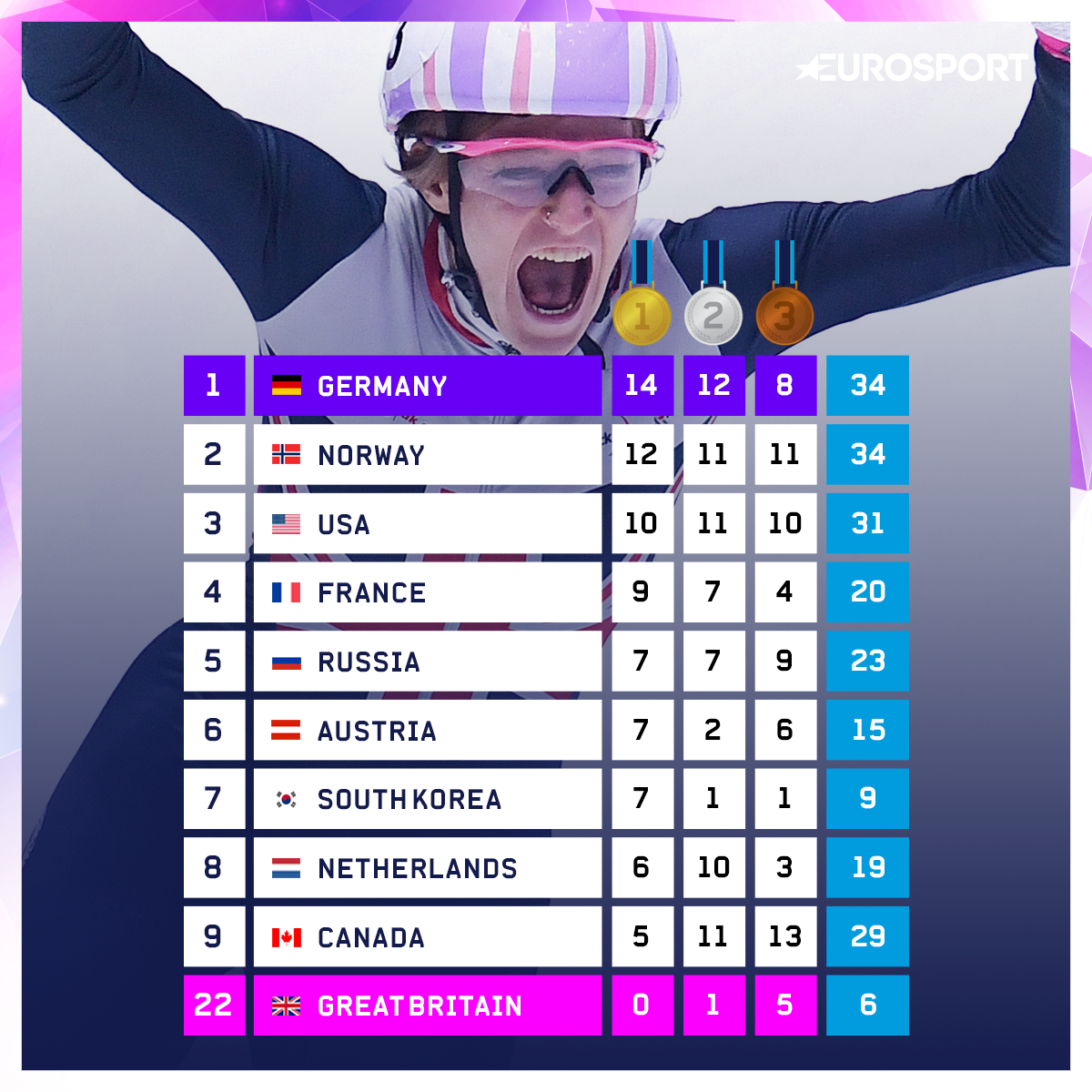PyeongChang 2018 Virtual Medal Table: Team GB tipped for record haul
:focal(179x135:181x133)/origin-imgresizer.eurosport.com/2015/03/26/1443595-30868867-310-310.jpg)
Updated 23/03/2017 at 12:17 GMT
With the winter sports season coming to a close, Gracenote Sports have published their updated Virtual Medal Table for the 2018 PyeongChang Winter Olympic Games - and it makes great reading for Great Britain.
Elise Christie of Britain celebrates
Image credit: Reuters
When Gracenote first published their Virtual Medal Table, Team GB were projected to win three medals overall: a silver for Lizzy Yarnold in the skeleton and a silver and a bronze for Elise Christie in the 1000m and 500m short track respectively.
But after at the World Short Track Speed Skating Championships earlier this month in Rotterdam, where she won gold in the 1000m, 1500m and overall event, she has been upgraded to three medals (one silver, two bronze) all by herself. She would have been tipped to take gold by Gracenote in the 1000m but Choi Min-jeong's home advantage swings it for her.
A number of other fine performances by Brits in recent weeks - most notably in slopestyle, with James Woods and Isabel Atkin both winning bronze at the Freestyle World Championships in Sierra Nevada - have also bolstered their hopes of coming home with a record total medal haul, even if no golds are forecast at this stage. Two years ago they secured their biggest ever medal collection in a Summer Games on foreign soil when beating China to second place in the Rio 2016 medal table.
/origin-imgresizer.eurosport.com/2017/03/13/2042434-42844167-2560-1440.jpg)
Elise Christie claims overall title, and third gold
Simon Gleave, head of analysis at Gracenote Sports, said:
Elise Christie's success at the World Short Track Championships has improved Great Britain's projected medal total in Pyeongchang to six, half of which are forecast to be picked up by the Scottish short tracker. Six medals would be Great Britain's best at a Winter Olympics, beating the four won in Sochi and at Chamonix 1924. Curling, freestyle skiing, skeleton and snowboarding also provide realistic medal hopes for the British.
Gracenote's medal forecasts for Team GB are as follows:
| Sport | Event | Medal | Athlete |
| Freestyle skiing | Slopestyle | Bronze | James Woods |
| Freestyle skiing | Slopestyle | Bronze | Isabel Atkin |
| Short track | 1000m | Silver | Elise Christie |
| Short track | 1500m | Bronze | Elise Christie |
| Short track | 500m | Bronze | Elise Christie |
| Skeleton | Individual | Bronze | Lizzy Yarnold |
Norway were initially projected to finish top of the medal table having come second to Russia in Sochi, but in their latest analysis, Gracenote expect Germany to supplant them at the top of the pile. Russia, with suspensions, investigations and accusations of "state-sponsored doping" besmirching their huge effort three years ago, are predicted to drop to fifth.
/origin-imgresizer.eurosport.com/2017/03/17/2045112-42897727-2560-1440.jpg)
Laura Dahlmeier
Image credit: AFP
Germany's big increase is thanks in large part to one potential superstar of the PyeongChang games. As Gleave explains:
Biathlete Laura Dahlmeier is forecast to be the star of Pyeongchang with six medals including five golds. No German competitor at a single Winter Olympics has won more than three medals. Michael Greis is the only German to have won three gold medals (2006). Dahlmeier's projected gold total has increased by two since last month due to her World Championship win in the 15km individual event and her part in Germany's mixed relay gold at the World Championships. The five gold medals and one silver now projected for Dahlmeier in South Korea next year would be a repeat of her performance at last month's World Championships.

How is the table worked out? Gleave explained the process when the initial table was published...
How are the projections made?
We use results data in "world class events" starting with the 2014 Olympic Games and continuing with World Championships and World Cups or equivalent up to the Olympic Games in Pyeongchang. These results are weighted for the strength of the competition so a World Championships weighs more than a World Cup event for example. They are also weighted for recency so an event which took place last week is more important than one from two or three years ago.
How accurate were the projections for Sochi and Rio (in terms of total medals and individual winners?)
Sport is an unpredictable business, which is why we spend so much of our lives watching it. However, in terms of total medals we would expect to get reasonably close to reality - so within a handful of medals and a very good relationship to the actual rank order. Having said that, we notice that countries over and underperform the data and this Is interesting in itself. In Sochi for example, Russia did a great deal better than the data had suggested they would. The Dutch team's utter dominance of speed skating was also a shock to all and was again a lot better than the data suggested.
At individual level, the margins are very tiny so illness, not being absolutely fit and other things can play a part which it is difficult to foresee. In addition, events like the men's downhill or many of the short track speedskating races are highly unpredictable and often throw up surprise winners. In Sochi, data did a little bit better in terms of predicting the actual medallists than the experts who also attempt this exercise without mathematics.
To explore the Virtual Medal Table further, visit the Gracenote website now
Scan me
Related Topics
Share this article
Advertisement
Advertisement